Richard Henry Pratt lends support to the request of the Northern Arapaho U.S. Indian Agent that the Chiefs from the Northern Arapaho be allowed to visit Carlisle as was promised when they sent their children. Pratt notes that Northern Arapaho students are excellent students and a visit from the Chiefs should serve to strengthen the argument of…
Letters/Correspondence
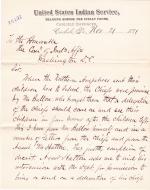
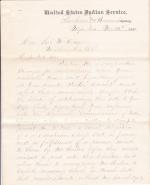
Charles Hatton, U.S. Indian Agent at the Shoshone and Bannock Agency, writes asking for assistance from Michigan Senator Thomas W. Ferry in allowing him to bring a delegation of five Arapaho Chiefs to Carlisle and Washington D.C.
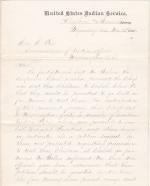
Charles Hatton, U.S. Indian Agent for the Northern Arapaho Agency, seeks authority to bring five Northern Arapaho Chiefs to Carlisle and Washington D.C. to visit their children. The Chiefs were promised when they sent their children that they would be allowed to visit and are seeking to have this promised fulfilled.
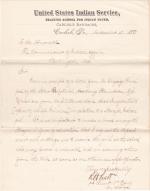
Richard Henry Pratt forwards two letters along with his recommendation that Antoinette Williams, a member of the Navajo Nation, be allowed to be enrolled at the Carlisle Indian School. The two forwarded letters indicate that Williams was brought east to the Blair Academy in Blairstown, New Jersey by J. V. Landerdale as Landerdale hoped she…
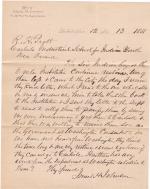
Richard Henry Pratt forwards a letter from Israel H. Johnson seeking to have six students from the Quapaw Nation transferred to the Carlisle Indian School. Johnson notes that the students believed they were going to Carlisle and were as a result unhappy about being unable to learn a trade in addition to their schooling. Pratt believed that the…
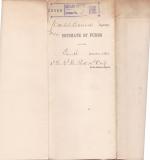
Richard Henry Pratt submits a "Special" Estimate of Funds form for $1,146.77 for areas covering pay of employees, hospital, and contingencies.
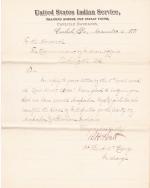
Richard Henry Pratt notes that there are several Arapaho students who can serve as an interpreter for the Arapaho and Shoshone Indian party.
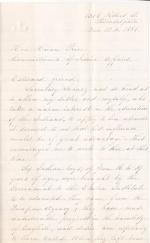
Susan Longstreth writes to the Hiram Price, the Commissioner of Indian Affairs, in support of transferring six Quapaw Nation students from the Emlen Institute to the Carlisle Indian School.
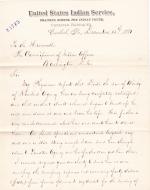
Richard Henry Pratt requests authority to send Duke (Frog) to his home at the Rosebud Agency at government expense due to his poor health.
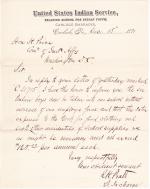
Richard Henry Pratt notes that the Carlisle Indian School can accept the Emlen Institute students from the Quapaw Nation with no additional increase in school staff.
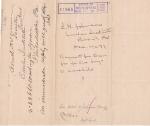
The Secretary of the Board of Trustees for the Emlen Institute Israel H. Johnson, writes in support of transferring the six Quapaw Nation students from the Emlen Institute to the Carlisle Indian School.
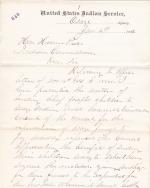
L. J. Miles, U.S. Indian Agent at the Osage Agency, sends a petition from the Osage Council to send their children to school. In particular Chief Josephs children and some other boys are to be sent to the Osage Mission School. Miles also notes that he believes he can find up to twenty students to be sent to Carlisle or a similar school with…
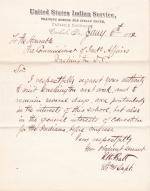
Richard Henry Pratt seeks to visit Washington D.C. in order to advocate for the interests of the Carlisle Indian School in addition to the education of Indian students in general.
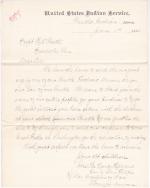
Jose La Cruz Marcus, the Governor of the San Felipe, and Lorenzo Duran, the Captain of War, send Richard Henry Pratt a note of appreciation for educating the Pueblo students.
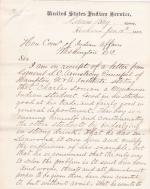
Green Bay Agency Indian Agent E. Stephens proposes transferring Charles Somains from the Hampton Institute to the Carlisle Indian School rather than having him return home. Stephens indicates that this is likely the best path for helping Somains and his mother.
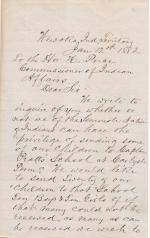
Seminole Chiefs from the Wewoka Indian Territory inquire from Hiram Price about the possibility of sending ten girls and ten boys to be educated at the Carlisle Indian School.
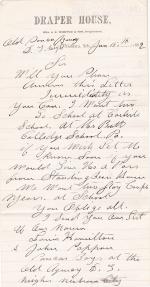
Louis Hamilton and John Pappan, two members of the Ponca Nation, request to be enrolled at the Carlisle Indian School.
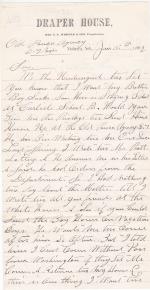
Ponca Chief Standing Bear requests that his nephew William Snake be allowed to return home during his vacation from the Carlisle Indian School.
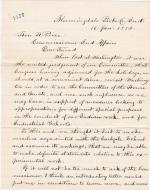
B. C. Hobbs requests an introductory letter to visit the Carlisle Indian School in order to provide specific points during Congressional testimony in support of funding for Industrial Schools and other work.
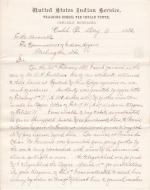
Richard Henry Pratt relays a copy of the last message he received from former Carlisle Indian School physician Dr. W. H. Faulkner regarding expenses accrued by Dr. Faulkner while returning two students to their homes at the Rosebud Agency. Due to delays Dr. Faulkner was stuck at Prairie du Chien, Wisconsin where one student died. Pratt notes…
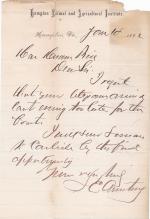
S. C. Armstrong acknowledges that he will transfer Charles Somains to Carlisle at the earliest opportunity from the Hampton Institute.
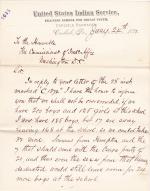
Richard Henry Pratt details the additional capacity of the Carlisle Indian School at the beginning of 1882. He notes that the school is capable of having 200 boys and 125 girls on site at the school. In addition by sending students on the outing program the total capacity of the school further increase. He notes that there would be room for the…
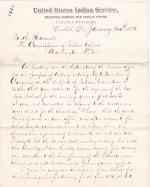
Richard Henry Pratt requests an increase in the proposed appropriation for 1883 allocated to the Carlisle Indian School.
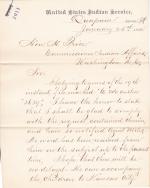
D. B. Dyer, U.S. Indian Agent at the Quapaw Indian Agency, notes that he will comply with an order from the Department of Indian Affairs to meet children in order to accompany them to Carlisle on their travels in Kansas City.
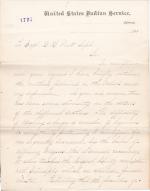
C. M. Semple, the Principal of the Education Department at the Carlisle Indian School provides a report on the teaching methods, educational foundations, and principles guiding the teachers at Carlisle.
